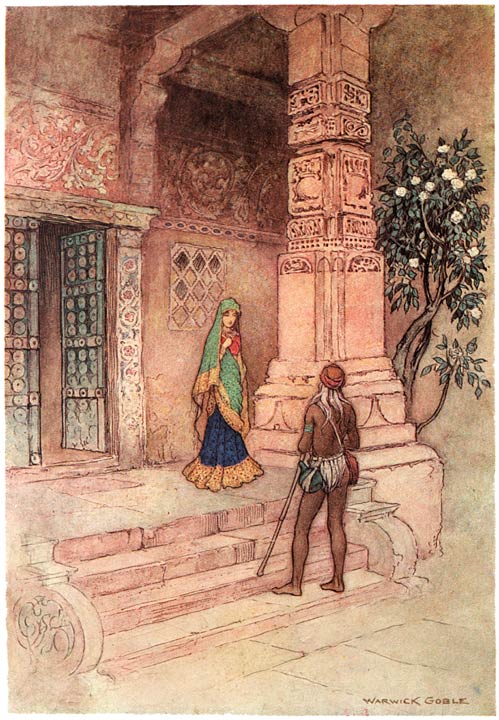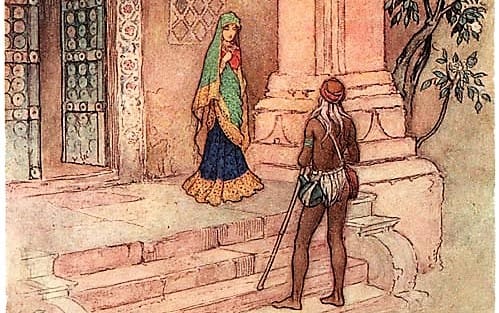- Life’s Secret (Folk-Tales of Bengal) – Part I
- Life’s Secret (Folk-Tales of Bengal) – Part II
There was a king who had two queens, Duo and Suo. Both of them were childless. One day a Faquir (mendicant) came to the palace gate to ask for alms. The Suo queen went to the door with a handful of rice. The mendicant asked whether she had any children. On being answered in the negative, the holy mendicant refused to take alms, as the hands of a woman unblessed with the child are regarded as ceremonially unclean.
He offered her a drug for removing her barrenness, and she expressed her willingness to receive it, he gave it to her with the following directions:—“Take this nostrum, swallow it with the juice of the pomegranate flower; if you do this, you will have a son in due time. The son will be exceedingly handsome, and his complexion will be of the colour of the pomegranate flower, and you shall call him Dalim Kumar. As enemies will try to take away the life of your son, I may as well tell you that the life of the boy will be bound up in the life of a big boal fish which is in your tank, in front of the palace. In the heart of the fish is a small box of wood, in the box is a necklace of gold, that necklace is the life of your son. Farewell.”

In the course of a month or so, it was whispered in the palace that the Suo queen had hopes of an heir. Great was the joy of the king. Visions of an heir to the throne, and of a never-ending succession of powerful monarchs perpetuating his dynasty to the latest generations, floated before his mind and made him glad as he had never been in his life. The usual ceremonies performed on such occasions were celebrated with great pomp, and the subjects made loud demonstrations of their joy at the anticipation of so auspicious an event as the birth of a prince. In the fullness of time, the Suo queen gave birth to a son of uncommon beauty. When the king the first time saw the face of the infant, his heart leapt with joy. The ceremony of the child’s first rice was celebrated with extraordinary pomp, and the whole kingdom was filled with gladness.
In the course of time, Dalim Kumar grew up a fine boy. Of all sports, he was most addicted to playing with pigeons. This brought him into frequent contact with his stepmother, the Duo queen, into whose apartments Dalim’s pigeons had a trick of always flying. The first time the pigeons flew into her rooms, she readily gave them up to the owner; but the second time she gave them up with some reluctance. The fact is that the Duo queen, perceiving that Dalim’s pigeons had this happy knack of flying into her apartments, wished to take advantage of it for the furtherance of her own selfish views. She naturally hated the child, as the king, since his birth, neglected her more than ever, and idolised the fortunate mother of Dalim. She had heard, it is not known how that the holy mendicant that had given the famous pill to the Suo queen had also told her of a secret connected with the child’s life. She had heard that the child’s life was bound up with something—she did not know with what. She determined to extort that secret from the boy. Accordingly, the next time the pigeons flew into her rooms, she refused to give them up, addressing the child thus:—“I won’t give the pigeons up unless you tell me one thing.”
Dalim. What thing, mamma?
Duo. Nothing particular, my darling; I only want to know what your life is.
Dalim. What is that, mamma? Where can my life be except in me?
Duo. No, child; that is not what I mean. A holy mendicant told your mother that your life is bound up with something. I wish to know what that thing is.
Dalim. I never heard of any such thing, mamma.
Duo. If you promise to inquire of your mother in what thing your life is, and if you tell me what your mother says, then I will let you have the pigeons, otherwise not.
Dalim. Very well, I’ll inquire, and let you know. Now, please, give me my pigeons.
Duo. I’ll give them on one condition more. Promise me that you will not tell your mother that I want the information.
Dalim. I promise.
The Duo queen let go of the pigeons, and Dalim, overjoyed to find again his beloved birds, forgot every syllable of the conversation he had had with his stepmother. The next day, however, the pigeons again flew into the Duo queen’s rooms. Dalim went to his stepmother, who asked him for the required information. The boy promised to ask his mother that very day, and begged hard for the release of the pigeons. The pigeons were at last delivered. After the play, Dalim went to his mother and said—“Mamma, please tell me in what my life is contained.” “What do you mean, child?” asked the mother, astonished beyond measure at the child’s extraordinary question. “Yes, mamma,” rejoined the child, “I have heard that a holy mendicant told you that my life is contained in something. Tell me what that thing is.” “My pet, my darling, my treasure, my golden moon, do not ask such an inauspicious question. Let the mouth of my enemies be covered with ashes, and let my Dalim live forever,” said the mother, earnestly. But the child insisted on being informed of the secret. He said he would not eat or drink anything unless the information was given to him. The Suo queen, pressed by the importunity of her son, in an evil hour told the child the secret of his life. The next day the pigeons again, as fate would have it, flew into the Duo queen’s rooms. Dalim went for them; the stepmother plied the boy with sugared words and obtained the knowledge of the secret.
The Duo queen, on learning the secret of Dalim Kumar’s life, lost no time in using it for the prosecution of her malicious design. She told her maid-servants to get for her some dried stalks of the hemp plant, which are very brittle, and which, when pressed upon, make a peculiar noise, not unlike the cracking of joints of bones in the human body. These hemp stalks she put under her bed, upon which she laid herself down and gave out that she was dangerously ill. The king, though he did not love her as well as his other queen, was duty-bound to visit her in her illness. The queen pretended that her bones were all cracking; and sure enough, when she tossed from one side of her bed to the other, the hemp stalks made the noise wanted. The king, believing that the Duo queen was seriously ill, ordered his best physician to attend her. With that physician, the Duo queen was in collusion. The physician said to the king that for the queen’s complaint there was but one remedy, which consisted in the outward application of something to be found inside a large boal fish which was in the tank before the palace. The king’s fisherman was accordingly called and ordered to catch the boal in question. On the first throw of the net, the fish was caught. It so happened that Dalim Kumar, along with other boys, was playing not far from the tank. The moment the boal fish was caught in the net, that moment Dalim felt unwell; and when the fish was brought up to land, Dalim fell down on the ground, and made as if he was about to breathe his last. He was immediately taken into his mother’s room, and the king was astonished upon hearing of the sudden illness of his son and heir. The fish was by the order of the physician taken into the room of the Duo queen, and as it lay on the floor striking its fins on the ground, Dalim in his mother’s room was given up for the loss. When the fish was cut open, a casket was found in it; and in the casket lay a necklace of gold. The moment the necklace was worn by the queen, that very moment Dalim died in his mother’s room.



